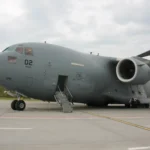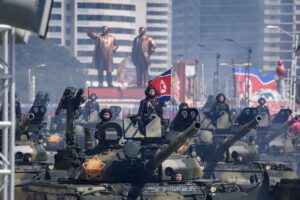Sanctions Have Hurt But Not Felled Russia—and Are Harming the Global South
Over the last six months, 38 Western and Asian states have leveled a growing barrage of sanctions against Russia. The speed at which this economic pressure was applied after the invasion of Ukraine sowed broad optimism in the West about the prospects and predictability of economic warfare. One architect of the strategy was feted as having “pierced Putin’s ‘sanction-proof’ economy.” Together with Russian setbacks on the battlefield, sanctions were touted as a powerful response that raised the odds of a Ukrainian victory—and even the chances of regime change in Russia.
But although Fortress Russia was breached, it has so far neither collapsed nor surrendered. Capital controls and interest rate hikes by the Russian government staved off a financial crisis and the collapse of the ruble. After an initial dip, Russian oil production and exports recovered, driven by an increase in purchases from China, India, and other Asian countries. For the country’s core provinces, unemployment has remained at manageable levels. The long-term outlook for Russia is a very dire one of economic stagnation. But it is less immediately catastrophic than many first imagined: the country’s central bank now foresees a downturn “more prolonged in time and perhaps less deep.”
Yet if the most optimistic Western hopes for sanctions have not been realized, the opposite prediction—that sanctions would have catastrophically adverse consequences for the countries imposing them—also turned out to be inaccurate. Warnings that sanctions amounted to Western overreach and would accelerate the demise of the U.S. dollar as the world’s reserve currency and lead to the general disintegration of the global economy proved incorrect: the dollar is today stronger than before and trade flows have remained broadly stable.
To reduce their exposure to U.S. sanctions and interest rate policy, countries like Brazil, China, India, Turkey, and the United Arab Emirates are increasingly using regional currencies in bilateral trade. Yet this has hardly dented the dollar’s broader appeal as a reserve currency. Russia’s retaliatory reduction in gas deliveries to Europe, moreover, is a weapon that can only be used once. The Kremlin’s gas embargo will ultimately encourage diversification and a switch to renewables, fortifying rather than weakening the region’s energy security.
There is a notable parallel between the expectations that Russia harbored for its military invasion and what the West hoped its economic sanctions would achieve: both parties wanted to defeat their opponents with a quick, sudden strike producing immediate collapse. This obviously did not come to pass. Indeed, both Ukraine’s recent triumphs on the battlefield and Putin’s eventual turn to mobilization in Russia may foreshadow a long war. Russia and the West have both adjusted and become increasingly hardened targets for each other’s economic weapons. Ultimately, the costs of this economic war will be borne mainly by weaker economies in the global South. States that lack the buffers—whether strategic commodity reserves, liquidity, or trade surpluses—to adapt to the new world of sanctions turmoil are especially vulnerable.
No Domestic Backup
Although Russian President Vladimir Putin managed to avoid a Soviet-style collapse in the face of massive sanctions, the Russian economy has suffered severe damage and is likely to endure more. Russians can expect economic stagnation and growing isolation from the West for the foreseeable future. It is an open question, however, whether this socioeconomic deterioration will move citizens to demand an end to the war, let alone motivate their government to wind down its ongoing aggression against Ukraine. Historically, sanctions have the highest chance of producing major policy change when a political movement can act as a vehicle for popular mobilization. But despite some recent protests, years of intense political repression have reduced the possibilities for effective opposition. Perhaps the best that can be hoped is that economic deprivation will eventually render his regime materially incapable of continuing the war.
The absence of opposition movements powerful enough to benefit from sanctions explains why several states with economies much smaller than Russia’s—such as Belarus, Cuba, North Korea, Syria, and Venezuela—have proved to be fairly impervious politically to prolonged economic pressure. This is significant because several of these states were or are subject to more sweeping and strictly enforced sanctions than Russia is today. As with those nations, it is hard to envision a quick end to the current pressure campaign against Russia. Moscow’s intransigence and Ukraine’s confident pursuit of victory mean that if Russia does not return occupied territories to Ukraine—whether by force or by negotiation—economic restrictions are likely to remain in place.
That, of course, has implications for the global economy. Most important, it will further deepen the realignment of Western trade and finance away from Russia. The imposition of sanctions on a major commodity exporter initially drove up energy, food, and metals prices. These spikes ultimately subsided, but the process was painful and difficult. New sources of supply became available as U.S. oil reserves, Australian wheat, and Qatari natural gas found their way onto global markets.
When it became clear that the rollout of European sanctions on Russian energy exports would be slower than expected, pressure on oil and gas prices abated. By reducing demand for commodities, China’s economic slowdown helped lower inflation as well. G7 governments further assuaged markets by pursuing a price cap on Russian oil exports instead of a full embargo. Finally, in late July, a UN- and Turkish-sponsored grain export deal allowed for the release of Ukrainian grain, reducing worries about a global food shortage. Even the shock effect of the Russian gas embargo on Europe’s electricity prices already seems to have passed. Sanctions increase economic volatility; but the shocks do not seem to last very long.
In sum, the world economy is adaptable enough to partly offset the damage caused by a prolonged economic war. Government interventions to mitigate these effects were, however, belated and haphazard, even though the consequences of imposing sanctions on a major commodity-exporting country were entirely foreseeable. Going forward, any further sanctions must be implemented with greater macroeconomic foresight. Such prudence is essential not only to avoid collateral damage in Africa, Asia, and Latin America but also to preserve political unity among the countries already maintaining sanctions against Russia.
Hard to Tell
Amid the incessant news reports and propaganda narratives surrounding the war, it has been difficult to gauge the overall impact of Western sanctions. This problem is inherent to economic warfare: just as the economy is a composite picture of countervailing trends, the effects of sanctions are the result of conflicting political and economic forces. Consider the following two data points. First, Russian tanks are running on microchips cannibalized from washing machines. Second, trade statistics show a 241 percent year-on-year increase in Chinese chip exports to Russia. Both facts provide important insights into the complex and contradictory effects of sanctions: one shows the enormous damage that they are doing to Russia’s import-dependent industrial base while the other reflects a gradual, incomplete, and difficult process of adjustment and trade diversion.
Given the focus on mutual vulnerabilities, it is easy to forget that in war economies, resources are often more fungible than expected. Modern industrial economies usually contain some slack that can be used to absorb shocks. This is why Europe will suffer but survive the Russian gas embargo. Indeed, the “neutral” bloc in the world economy is key to furnishing such resources. China is selling cars and computers to Russia but also aiding European governments in securing additional gas, showing that it has a material interest in helping both sides in the economic war. The economic siege of Russia is far from complete, and the future of this campaign will increasingly turn on the actions of non-Western actors: China, but also African states, the emirates, India, Indonesia, Saudi Arabia, and Turkey.
Yet some neutral states lack the resilience and ability to adjust to the new geo-economics. An important example is the global scramble for liquefied natural gas. As European countries have bought up most of the available supply on global markets to restock their storage depots, Bangladesh and Pakistan have been forced to impose rolling blackouts on their combined population of 385 million to save electricity. Public finances in El Salvador, Egypt, Ghana, Sri Lanka, and Tunisia are also under severe strain. International financial institutions such as the World Bank and International Monetary Fund, along with G20 governments, should offer assistance to these countries in the months ahead to avoid economic and humanitarian disaster.
The twists and turns of the economic war against Russia caution against drawing premature or sweeping conclusions. If this war ends soon, that would be primarily the result of Ukraine’s impressive successes on the battlefield, where Kyiv has two major assets that Moscow lacks: well-trained and equipped troops and accurate intelligence about its opponent. If the military campaign does not have a conclusive outcome, sanctions will become entrenched as a quasi-permanent feature of Russian-Western relations.
It is imperative that Western policymakers prepare better for future crises caused by the use of financial, technological, and energy weapons. The Prussian field marshal Helmuth von Moltke famously said that no battle plan survives beyond its first contact with the enemy. The last six months have shown that this applies to economic warfare, too: no sanctions strategy extends with certainty beyond the first economic shock that it triggers.
Source: Foreign Affairs















